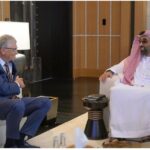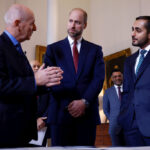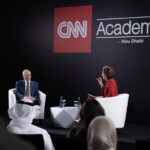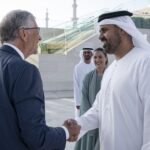On the Saudi road to Israel, orange and date groves point the way
A Jewish-American entrepreneur cruises the Arabian Peninsula and advises a go-slow approach on the Saudi-Israel diplomatic path
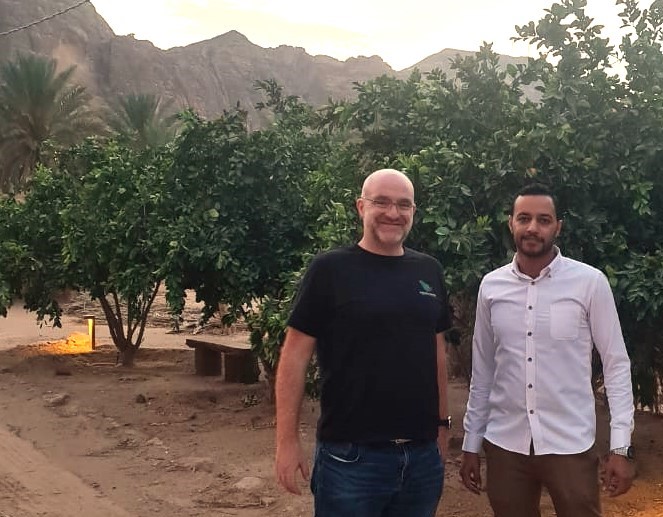
Bruce Gurfein (left) visits Saudi orange grove during his trans-Arabian road trip to Israel last week
Why wait for diplomatic relations when there’s plenty of room to do business in the gray areas that prevail between Saudi Arabia and Israel?
That’s the approach taken by Bruce Gurfein, a Jewish-American entrepreneur who has lived in the Gulf for 25 years. Operating from Dubai, in the United Arab Emirates, the 45-year-old New Yorker brokered indirect Arab-Israeli deals well before the 2020 Abraham Accords normalized Israel’s ties with the UAE and Bahrain.
To demonstrate that the Saudis are open to informal connections with Israel, Gurfein drove his Nissan Armada SUV last week on a 2,800-mile (4,500-km.) desert odyssey across the Arabian Peninsula. Starting from the UAE, Gurfein traveled through Saudi Arabia, Jordan and the West Bank before reaching Jerusalem. Throughout the journey, he took to Twitter to describe his journey to Israel through Saudi territory. He didn’t so much as get pulled over by Saudi police for a speeding ticket on the entire journey.
Official ties “will take time,” Gurfein told The Circuit, speaking last Thursday over WhatsApp from a Starbucks in the northwestern Saudi city of Tabuk. “It’s not going to happen overnight just because some president wants them to sign a peace agreement.”
President Joe Biden flew to Israel and Saudi Arabia in July on a diplomatic trip partly devoted to encouraging ties between the two countries. Biden cited an agreement enabling Israeli airlines to overfly the vast desert kingdom, saving time and costs to destinations in Asia, as progress toward that goal. Saudi Foreign Minister Prince Faisal bin Farhan later described the flight decision as a gesture unconnected to normalization and said closer ties require agreement on a two-state solution for the Israeli-Palestinian conflict.
Israelis and Saudis are generally barred from each other’s territory unless they have second passports issued by other countries, conditions similar to those in the UAE and Bahrain prior to the 2020 agreement. Several Israeli companies have managed to operate in Saudi Arabia through subsidiaries registered in other countries.
Gurfein is chief executive of Connect LLC, a technology investment firm owned by Abdullah Al Naboodah, one of the UAE’s wealthiest men. He is trying to set up a business accelerator in Saudi Arabia that will draw companies developing new methods for desert agriculture and ensuring food security. Those companies may come from a variety of countries, including Israel, he said. On the cross-country ride last week, Gurfein stopped at three Saudi farms that may be involved in the project, touring their orange and date groves in the dusty, desert soil.
“We’re hoping that the noise that this trip is going to create will bring additional companies,” Gurfein said. “We’re setting up the infrastructure so that when the companies come, we know where we can redirect them. That’s why we’re dealing with these farms.”
Gurfein’s route started in the UAE before he entered eastern Saudi Arabia and drove across the kingdom. He and his travel partner, Joe Koen, held business meetings in the capital city of Riyadh and toured some of the country’s cultural touchstones, including the ancient sites of AlUla and Hegra. At the western end of the country, Gurfein visited Neom, the futuristic trillion-dollar city under construction on the shores of the Red Sea, and then turned north to cross into Jordan. On Friday he entered Israel and ended the voyage in Jerusalem. Next week he starts the return trip.
For those hoping that Saudi Arabia becomes a full partner to the Abraham Accords, Gurfein’s advice is to slow down.
In a blog he posted on LinkedIn before hitting the road, Gurfein noted both the internal opposition to relations with Israel from the older generation of rulers in Saudi Arabia and social reforms instituted by the government that include the removal of anti-Jewish teachings from school curricula.
“A premature open peace agreement with Israel would inevitably hurt the rest of the changes and efforts within Saudi today and lead to a formal peace, a peace between governments, but not necessarily between their people,” Gurfein wrote. “If we want real peace to be achieved between Israel and Saudi Arabia, we need to build financial structures and trade platforms via third parties and countries that will allow the nations to get to know each other on a personal level and let the people see the benefits of business relationships and a true open peace.”
Israel has long-standing covert ties with Saudi Arabia and the kingdom says it remains committed to the Arab Peace Initiative from 2002, which proposed full diplomatic ties with all Arab countries once Israel and the Palestinian Authority resolve their conflict. In the meantime, other private activists have tried to smooth the process, with efforts such as a visit to Saudi Arabia in June by 13 American Jewish leaders. The tour was arranged by Eli Epstein, a New York business executive and philanthropist, whose similar efforts helped form relationships that eventually led to Israel’s official ties with the UAE and Bahrain.
In representing Al Naboodah, Gurwein has forged a relationship with Israel’s biggest hospital, the Sheba Medical Center, which is planning to open a facility in the Emirates. “Bruce was 100% the first one to open doors for us in the UAE,” said the hospital’s spokesman, Steve Walz.
During the Biden summit in Jeddah, one of Israel’s largest companies trading on Wall Street, SolarEdge Technologies, signed an agreement with a Saudi investment company, Ajlan & Bros. A week later it was announced that Mithaq Capital, a Saudi family investment firm, accumulated the biggest stake in Israeli mobility intelligence company Otonomo Technologies. In May, the Wall Street Journal reported that Affinity Partners, a fund founded by Jared Kushner, the son-in-law and White House adviser to former President Donald Trump, would direct some of the $2 billion it got from the Saudi Public Investment Fund to Israeli startups.
While Gulf countries are investing in Israeli technology, Gurfein said Israelis need to recognize that they’re still a small player in the international arena and promote the businesses where they excel to big companies and projects in Saudi Arabia.
“Neom will buy things that they need,” he said, referring to the Saudi megacity. “If Israeli companies have technologies that they can’t find anywhere else, then we’re definitely going to see a good turnaround. But is Neom actively seeking Israeli technology? Less so.”

